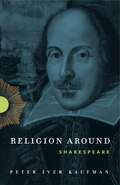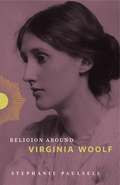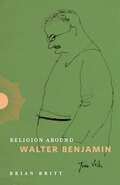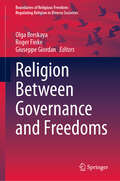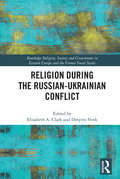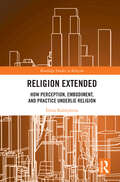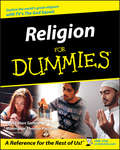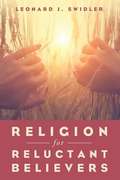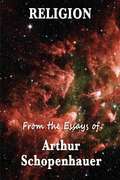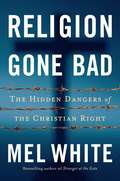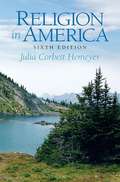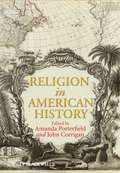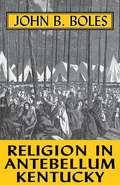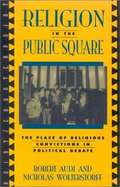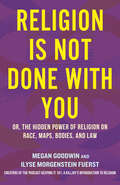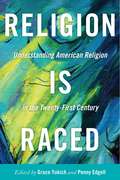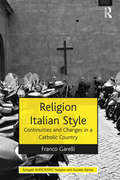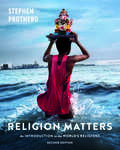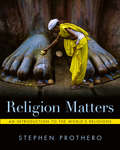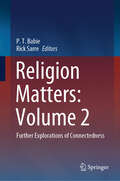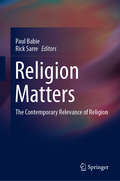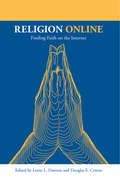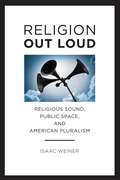- Table View
- List View
Religion Around Shakespeare (Religion Around)
by Peter Iver KaufmanFor years scholars and others have been trying to out Shakespeare as an ardent Calvinist, a crypto-Catholic, a Puritan-baiter, a secularist, or a devotee of some hybrid faith. In Religion Around Shakespeare, Peter Kaufman sets aside such speculation in favor of considering the historical and religious context surrounding his work. Employing extensive archival research, he aims to assist literary historians who probe the religious discourses, characters, and events that seem to have found places in Shakespeare’s plays and to aid general readers or playgoers developing an interest in the plays’ and playwright’s religious contexts: Catholic, conformist, and reformist. Kaufman argues that sermons preached around Shakespeare and conflicts that left their marks on literature, law, municipal chronicles, and vestry minutes enlivened the world in which (and with which) he worked and can enrich our understanding of the playwright and his plays.
Religion Around Shakespeare: Religion Around Shakespeare (Religion Around #1)
by Peter Iver KaufmanFor years scholars and others have been trying to out Shakespeare as an ardent Calvinist, a crypto-Catholic, a Puritan-baiter, a secularist, or a devotee of some hybrid faith. In Religion Around Shakespeare, Peter Kaufman sets aside such speculation in favor of considering the historical and religious context surrounding his work. Employing extensive archival research, he aims to assist literary historians who probe the religious discourses, characters, and events that seem to have found places in Shakespeare’s plays and to aid general readers or playgoers developing an interest in the plays’ and playwright’s religious contexts: Catholic, conformist, and reformist. Kaufman argues that sermons preached around Shakespeare and conflicts that left their marks on literature, law, municipal chronicles, and vestry minutes enlivened the world in which (and with which) he worked and can enrich our understanding of the playwright and his plays.
Religion Around Virginia Woolf (Religion Around #6)
by Stephanie PaulsellVirginia Woolf was not a religious person in any traditional sense, yet she lived and worked in an environment rich with religious thought, imagination, and debate. From her agnostic parents to her evangelical grandparents, an aunt who was a Quaker theologian, and her friendship with T. S. Eliot, Woolf’s personal circle was filled with atheists, agnostics, religious scholars, and Christian converts. In this book, Stephanie Paulsell considers how the religious milieu that Woolf inhabited shaped her writing in unexpected and innovative ways.Beginning with the religious forms and ideas that Woolf encountered in her family, friendships, travels, and reading, Paulsell explores the religious contexts of Woolf’s life. She shows that Woolf engaged with religion in many ways, by studying, reading, talking and debating, following controversies, and thinking about the relationship between religion and her own work. Paulsell examines the ideas about God that hover around Woolf’s writings and in the minds of her characters. She also considers how Woolf, drawing from religious language and themes in her novels and in her reflections on the practices of reading and writing, created a literature that did, and continues to do, a particular kind of religious work.A thought-provoking contribution to the literature on Woolf and religion, this book highlights Woolf’s relevance to our post-secular age. In addition to fans of Woolf, scholars and general readers interested in religious and literary studies will especially enjoy Paulsell’s well-researched narrative.
Religion Around Virginia Woolf (Religion Around)
by Stephanie PaulsellVirginia Woolf was not a religious person in any traditional sense, yet she lived and worked in an environment rich with religious thought, imagination, and debate. From her agnostic parents to her evangelical grandparents, an aunt who was a Quaker theologian, and her friendship with T. S. Eliot, Woolf’s personal circle was filled with atheists, agnostics, religious scholars, and Christian converts. In this book, Stephanie Paulsell considers how the religious milieu that Woolf inhabited shaped her writing in unexpected and innovative ways.Beginning with the religious forms and ideas that Woolf encountered in her family, friendships, travels, and reading, Paulsell explores the religious contexts of Woolf’s life. She shows that Woolf engaged with religion in many ways, by studying, reading, talking and debating, following controversies, and thinking about the relationship between religion and her own work. Paulsell examines the ideas about God that hover around Woolf’s writings and in the minds of her characters. She also considers how Woolf, drawing from religious language and themes in her novels and in her reflections on the practices of reading and writing, created a literature that did, and continues to do, a particular kind of religious work.A thought-provoking contribution to the literature on Woolf and religion, this book highlights Woolf’s relevance to our post-secular age. In addition to fans of Woolf, scholars and general readers interested in religious and literary studies will especially enjoy Paulsell’s well-researched narrative.
Religion Around Walter Benjamin (Religion Around)
by Brian BrittThis book shows how institutional religion and the religiosity of political and cultural life provide a necessary dimension to Walter Benjamin, one of the twentieth century’s greatest thinkers. Lived religion surrounded Benjamin, whose upper-middle-class Jewish family celebrated Christmas and Hanukkah in Berlin as the turmoil of war, collapsing empires, and modern urban life gave rise to the Nazi regime that would destroy most of Europe’s Jews, including Benjamin himself. Documenting the vitality and diversity of religious life that surrounded Benjamin in Germany, France, and beyond, Brian Britt shows the extent to which religious communities and traditions, especially those of Christians, influenced his work. Britt surveys and analyzes the intellectual, cultural, and social contexts of religion in Benjamin’s world and broadens the religious frame around discussions of his work to include lived religion—the daily practices of ordinary people. Seeing religion around Benjamin requires looking at forms of life and institutions that he rarely discussed. As Britt shows, dramatic changes in religious practices, particularly in Berlin, reflected broader political and cultural currents that would soon transform the lives of all Europeans.An original perspective on the religious context of a thinker who habitually raised questions about the survival of religion in modernity, Religion Around Walter Benjamin contributes to wider discussions of religious tradition and secular modernity in religious and cultural studies. It provides a foundational overview and introduction to the context of Benjamin’s writing that will be appreciated by scholars and students alike.
Religion Between Governance and Freedoms (Boundaries of Religious Freedom: Regulating Religion in Diverse Societies)
by Roger Finke Giuseppe Giordan Olga BreskayaThis edited volume proffers a sociological outlook on the challenges contemporary societies face when states attempt to govern religious and cultural diversity and still protect freedoms of and from religion claimed by individuals, communities, and institutions. The collection of chapters brings readers into both theoretical discussions and empirical research. It illustrates how the promise of religious freedom has become a burgeoning social issue at the center of struggles over equity, inclusion, and cohesion in both public institutions and everyday interactions. The book is divided into three parts: the state’s legal and political mechanisms governing religious freedom; the challenges of religious pluralism for public institutions and global communities; social perceptions of religious freedom as an indicator and criterion of human rights culture in society. An international group of authors provide reviews, case studies, and data-driven research for students, researchers and practitioners working in the sociology of religion.
Religion During the Russian Ukrainian Conflict (Routledge Religion, Society and Government in Eastern Europe and the Former Soviet States)
by Elizabeth A. Clark; Dmytro VovkThis book investigates how the military conflict between Russia and Ukraine has affected the religious situation in these countries. It considers threats to and violations of religious freedom, including those arising in annexed Crimea and in the eastern part of Ukraine, where fighting between Ukrainian government forces and separatist paramilitary groups backed and controlled by Russia is still going on, as well as in Russia and Ukraine more generally. It also assesses the impact of the conflict on church-state relations and national religion policy in each country and explores the role religion has played in the military conflict and the ideology surrounding it, focusing especially on the role of the Ukrainian and Russian Orthodox churches, as well as on the consequences for inter-church relations and dialogue.
Religion Extended: How Perception, Embodiment, and Practice Underlie Religion (Routledge Studies in Religion)
by Elena KalmykovaReligion Extended contributes to discussions of aspects of religion that go beyond the epistemology of belief, incorporating other states such as understanding, emotion, knowledge of persons, knowledge-how, as well as practice. The author looks to bridge the gap in the study of religion between research of religious beliefs, on the one hand, and research of religious practices, on the other. She reconsiders key methodological concepts that traditional philosophy of religion and neighbouring disciplines (e.g. cognitive science of religion, psychology of religion, and theology) take for granted, such as “religious belief” and “religious faith”. The book offers a compelling and provocative reframing of these notions by drawing on cutting-edge developments in cognitive science, as well as insights from an Orthodox Christian perspective, which shed light on religion in important ways that tend to be neglected. Presenting a challenge to the received conceptual framework, this innovative and thought-provoking volume will advance discussions and open new areas of research.
Religion For Dummies
by Rabbi Marc Gellman Monsignor Thomas HartmanWhy are we here? How should we live? What happens after we die? Why does evil exist? Religion For Dummies explains how the world's great religions answer questions that persist through generations. Authors Rabbi Marc Gellman and Monsignor Thomas Hartman are trusted religious advisors known as the God Squad. With wonderful wit and incredible wisdom, they host a daily talk show which reaches nearly 4 million homes in the New York area, and have appeared on numerous TV and radio shows. This book is not a scholarly theological treatise; it's a lively, practical, hands-on resource that will help you better understand your own religion and others. You'll explore: Religion's role in the family and in the workplace The beliefs and practices of Christianity, Judaism, Islam, and other religions Religion's impact during major passages in life such as birth, death, and marriage How to join a religion and how to pray How religion can help you deal with issues in every day life such as conflict, adversity, marriage, divorce, and more Religious rituals and ethics Religion for Dummies touches on lesser-known religions (such as, Zoroastrianism, Jainism, Sikhism). It explores how people of various faiths pray, celebrate life and death, and view moral issues. The book does not tell you what to believe, but rather encourages you to live as you believe and let your religion infuse every aspect of your life. It doesn't give simple answers to haunting, complex questions; it helps you find your own answers and pursue your own spiritual path!
Religion For Reluctant Believers
by Leonard J. SwidlerThis is a volume written for persons who live in the mental world of modernity--that is, in a world that cherishes (1) freedom as the core of being human; (2) critical-thinking reason as the arbiter of what to affirm or not; (3) history, process, and dynamism at the heart of human life and society; and (4) dialogue with those who think differently yet who sense that there is somehow more to life, to reality, than meets the eye: that there is a depth or spiritual dimension not captured in our everyday experiences, which is customarily called religion. <P><P>Religion for Reluctant Believers explores the meaning of life: its joys, problems, and terrors, its pluses and minuses. In short, it asks the question, do you want to buy into Religion with a capital r, into a particular religion, or into no religion at all?
Religion From the Essays of Arhur Schopenhauer
by Arthur SchopenhauerCollected here are five short essays, A Dialogue, A Few Words on Pantheism, On Books and Reading, Physiognomy, and, Psychological Observations, by the world renowned philosopher Arthur Schopenhauer.
Religion Gone Bad: The Hidden Dangers of the Christian Right
by Mel White"In Religion Gone Bad, Christian activist Mel White documents the alarming rise to power of fundamentalist Christians in American politics and religion. He reveals a vicious campaign that fundamentalists are waging against homosexuality and gay Americans in order to raise funds and mobilize volunteers in a much broader war to control church and state alike. White makes it abundantly clear that the true goals of today's fundamentalist leaders are nothing less than to break down the wall that separates church and state, superimpose their "moral values" on the U.S. Constitution, replace democracy with theocratic rule, and ultimately to create a new "Christian nation" ruled exclusively by "righteous men." Religion Gone Bad is a wake-up call for all of us to take heed."--BOOK JACKET.
Religion In America (Sixth Edition)
by Julia Corbett HemeyerReligion in America gives students and teachers a comprehensive yet concise introduction to the changing religious landscape of the United States. Extensively revised and updated, the Sixth Edition continues to engage students in reflection about religious diversity. The author presents the study of religion within the context of the humanities as a tool for developing understanding and appreciation of communities of faith other than ones own, and for understanding the dynamics at work in religion in the United States today.
Religion In American History
by Amanda Porterfield John CorriganThis student-friendly introduction combines both thematic and chronological approaches in exploring the pivotal role religion played in American history - and of its impact across a range of issues, from identity formation and politics, to race, gender, and class. <p><p> A comprehensive introduction to American religious history that successfully combines thematic and chronological approaches, aiding both teaching and learning <p> Brings together a stellar cast of experts to trace the development of theology, the political order, practice, and race, ethnicity, gender and class throughout America's history <p> Accessibly structured in to four key eras: Exploration and Encounter (1492-1676); The Atlantic World (1676-1802); American Empire (1803-1898); and Global Reach (1898-present). <p> Investigates the role of religion in forming people's identities, emotional experiences, social conflict, politics, and patriotism
Religion In Antebellum Kentucky
by John B. Boles"An excellent survey of religion and its significance in the first eighty-five years of Kentucky's history. John B. Boles is professor of History at Rice University and managing editor of the Journal of Southern History. He is the author and editor of several books, including Masters and Slaves in the House of the Lord, Black Southerners, and The Great Revival. He edits the series ""Religion in the South"" for the University Press of Kentucky.
Religion In The Public Square: The Place Of Religious Convictions In Political Debate (Point/Counterpoint #No. 94)
by Robert Audi Nicholas WolterstorffThe relation between religion and politics is a perennial concern of political philosophy, but it has never been more important than it is now. Separation of church and state is being widely challenged and vigorously debated.
Religion Is Not Done with You: Or, the Hidden Power of Religion on Race, Maps, Bodies, and Law
by Megan Goodwin Ilyse Morgenstein FuerstA smart, irreverent, and accessible guide to thinking more deeply about how religion permeates and shapes the world around us –and why you need to understand the work it's doingReligion lurks in the floorboards of our daily lives, whether we want it to or not. A departure from more traditional approaches to "Religion 101," Religion Is Not Done with You gives thought-provoking context to the basics of religious studies by challenging readers to consider the origins of their assumptions about religion and broaden their perspectives on what religion is and does.Religion scholars and Keeping It 101 podcast duo Ilyse Morgenstein Fuerst and Megan Goodwin offer their straightforward, plainspoken overviews of religious studies theory: that religion is what people do (not just beliefs or individual practices); that people are complicated and messy and constantly changing, which means religion is also complicated and messy and constantly changing; that religion shapes what choices you get to make. Choices like what you can learn in school; how your government works; what kind of options you have (or increasingly don&’t have) in caring for your own body.Sure, you have the choice to participate in religion or not. But how you make that choice builds on your entire personal history, your connection to communities and regions, and the systems that surround you. All of which have been shaped by religion.Religion is systems and structures and assumptions we didn&’t create or choose – and, to be honest, we might not even like or agree with. You can feel however you want to feel about religion, but religion is shaping your world whether you like it or not. And if you don&’t like how religion is shaping our world? This book might just be your first step in diagnosing the problems and agitating for positive change. Even if you are done with religion, religion is not done with you.
Religion Is Raced: Understanding American Religion in the Twenty-First Century (Washington Mews)
by Penny Edgell Grace YukichDemonstrates how race and power help to explain American religion in the twenty-first centuryWhen White people of faith act in a particular way, their motivations are almost always attributed to their religious orientation. Yet when religious people of color act in a particular way, their motivations are usually attributed to their racial positioning. Religion Is Raced makes the case that religion in America has generally been understood in ways that center White Christian experiences of religion, and argues that all religion must be acknowledged as a raced phenomenon. When we overlook the role race plays in religious belief and action, and how religion in turn spurs public and political action, we lose sight of a key way in which race influences religiously-based claims-making in the public sphere.With contributions exploring a variety of religious traditions, from Buddhism and Islam to Judaism and Protestantism, as well as pieces on atheists and humanists, Religion Is Raced brings discussions about the racialized nature of religion from the margins of scholarly and religious debate to the center. The volume offers a new model for thinking about religion that emphasizes how racial dynamics interact with religious identity, and how we can in turn better understand the roles religion—and Whiteness—play in politics and public life, especially in the United States. It includes clear recommendations for researchers, including pollsters, on how to better recognize moving forward that religion is a raced phenomenon.With contributions by Joseph O. Baker, Kelsy Burke, James Clark Davidson, Janine Giordano Drake, Ashley Garner, Edward Orozco Flores, Sikivu Hutchinson, Sarah Imhoff, Russell Jeung, John Jimenez, Jaime Kucinskas, Eric Mar, Gerardo Martí, Omar M. McRoberts, Besheer Mohamed, Dawne Moon, Jerry Z. Park, Z. Fareen Parvez, Theresa W. Tobin, and Rhys H. Williams.
Religion Italian Style: Continuities and Changes in a Catholic Country (AHRC/ESRC Religion and Society Series)
by Franco GarelliItaly’s traditional subcultures - Communist, Socialist, Liberal, Republican, Right-wing - have largely dissolved and yet Catholics have retained their vitality and solidity. How can the vast majority of Italians continue to maintain some connection with Catholicism? How much is the Italian situation influenced by the closeness of the Vatican? Examining the religious condition of contemporary Italy, Religion Italian Style argues that the relationship between religion and society in Italy has unique characteristics when compared with what is happening in other European Catholic Countries. Exploring key topics and religious trends which question how the population feel - from the laity and the role of religions in the public sphere, to moral debates, forms of religious pluralism, and new spiritualities - this book questions how these affect religious life, and how intricately religion is interwoven with the nation’s fabric and the dynamics of the whole society.
Religion Matters (Second Edition)
by Stephen ProtheroCultivating religious literacy through diverse stories and dynamic learning tools A breakout success in its first edition, Religion Matters employs an innovative four-part model for understanding the uniqueness of each religion. It builds religious literacy through storytelling— incorporating stories that animate beliefs and practices and illuminate the internal diversity within religious traditions. Unparalleled tools for student learning further build religious literacy and provide opportunities for engagement with the sights and sounds of religious life. In the Second Edition, a new Norton Illumine Ebook promotes active reading through confidence-building Check Your Understanding questions that offer rich, answer-specific feedback; supportive audio pronunciations; and engaging videos. A new chapter on Yoruba religion enriches and expands the thoughtful coverage of the diversity of religions through an engrossing telling of history and lived experiences of Yoruba practitioners in Africa and the Americas. This purchase offers access to the digital ebook only.
Religion Matters: An Introduction To The World's Religions
by Stephen ProtheroBuilding religious literacy through the greatest stories ever told A religion is a system of stories, and there is no better way to engage with the world’s religions than through the stories that animate their beliefs and practices. Through the exploration of these ancient stories and contemporary practices, Stephen Prothero, a New York Times–bestselling author and gifted storyteller, helps students better grasp the role of religion in our fractured world and to develop greater religious literacy. This purchase offers access to the digital ebook only.
Religion Matters: Further Explorations of Connectedness
by Rick Sarre P. T. BabieThis book constitutes the second volume of 'Religion Matters: The Contemporary Relevance of Religion' (Springer, 2020). Offering a fresh and much-needed perspective, it explores the role of religion in the modern, neo-liberal world. The book acclaims that 'religion' is a contextual and contested term, which is extensively discussed in the Introduction.Designed to be read selectively, this book allows readers to delve into topics and traditions of specific interest without the necessity of reading the entire volume. In contrast to volume 1, where contributors critically engaged with religion and various disciplines, this book poses a fundamental question: Can religion contribute to the discipline under consideration?Authors were selected based on their ability to address this question. Some chapters concluded that religion may offer very little to the discipline under consideration, highlighting the value of volume 1's critical stance on the place of religion incontemporary society. However, the project's overall aim remained somewhat unfulfilled, leading to the creation of this second volume.The primary omission from the first book was a comprehensive exploration of the sciences and health sciences, which this second volume aims to rectify. Furthermore, additional authors were chosen to investigate the nature of connectedness facilitated by religion, horizontally through membership within wider communities, societies, cultures, or religious traditions, and vertically by examining historical relationships within a particular faith tradition, culture, community, or society. This volume also broadens its focus to include non-Christian perspectives, Indigenous perspectives, and an increased representation of female contributors.
Religion Matters: The Contemporary Relevance of Religion
by Rick Sarre Paul BabieThis book draws together leaders in science, the health sciences, the humanities, and the social sciences to investigate the role of religion, its meaning and relevance, for their area of specialization. It provides a much-needed fresh perspective on the way in which religion operates within the modern, neo-liberal world. The book approaches the topic by way of a critical engagement between religion, broadly defined, and the individual disciplines in which each of the contributors is expert. Rather than simply taking the dogmatic position that religion offers something to every possible discipline, each of the chapters in this collection addresses the question: is there something that religion can offer to the discipline in question? That is the value of the book – it takes a truly critical stance on the place of religion in contemporary society.
Religion Online: Finding Faith on the Internet
by Douglas E. Cowan Lorne L. DawsonReligion Online provides an accessible and comprehensive introduction to this burgeoning new religious reality, from cyberpilgrimages to neo-pagan chatroom communities. A substantial introduction by the editors presenting the main themes and issues is followed by sixteen chapters addressing core issues of concern such as youth, religion and the internet, new religious movements and recruitment, propaganda and the countercult, and religious tradition and innovation.
Religion Out Loud: Religious Sound, Public Space, and American Pluralism (North American Religions #14)
by Isaac WeinerFor six months in 2004, controversy raged in Hamtramck, Michigan, as residents debated a proposed amendment that would exempt the adhan, or Islamic call to prayer, from the city’s anti-noise ordinance. The call to prayer functioned as a flashpoint in disputes about the integration of Muslims into this historically Polish-Catholic community. No one openly contested Muslims’ right to worship in their mosques, but many neighbors framed their resistance around what they regarded as the inappropriate public pronouncement of Islamic presence, an announcement that audibly intruded upon their public space.Throughout U.S. history, complaints about religion as noise have proven useful both for restraining religious dissent and for circumscribing religion’s boundaries more generally. At the same time, religious individuals and groups rarely have kept quiet. They have insisted on their right to practice religion out loud, implicitly advancing alternative understandings of religion and its place in the modern world.In Religion Out Loud, Isaac Weiner takes such sonic disputes seriously. Weaving the story of religious “noise” through multiple historical eras and diverse religious communities, he convincingly demonstrates that religious pluralism has never been solely a matter of competing values, truth claims, or moral doctrines, but of different styles of public practice, of fundamentally different ways of using body and space—and that these differences ultimately have expressed very different conceptions of religion itself. Weiner’s innovative work encourages scholars to pay much greater attention to the publicly contested sensory cultures of American religious life.
